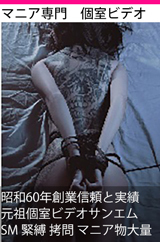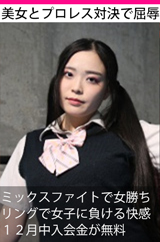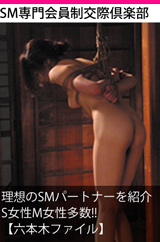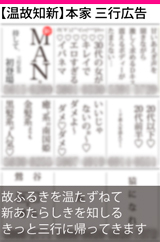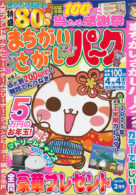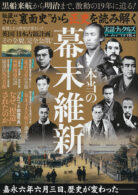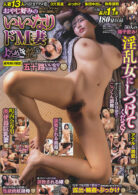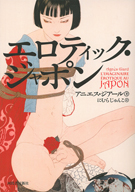 |
Erotical Parade Japan
フランス人ジャーナリストのエロティック比較文化論 |
気鋭の女性フランス人カウンターカルチャー専門ジャーナリスト、アニエス・ジアールが、「奇妙で豊穣な性文化」について日本の様々な文化的側面から掘り下げていくユニークな比較文化論。未曾有の大地震に見舞われた日本。原発問題にも揺れながら困難な状況に立ち向かおうとしている今、アニエスが日本の持つ強さの秘密について語ります。
子供ながら、私は日本に感銘を受け、魅了されていった。
私のような何百万という子供が同じように感じている、日本の精神はサバイバルなのだ。
9歳のときに、松本零士の『宇宙海賊キャプテンハーロック』を観た。その第一話は世界の終わりを描いていた。それは広島の100倍くらい酷いようだった。
私は驚いた。世界の終わりから物語を始めるなんてできるのだろうか?
西洋では、世界の終わりは物語の終わりだ。時間に対する概念が異なるので、我々にとって(イエス・キリスト以来)時間は線状のものであり、そこには必ず始まりと終わりがある。
しかし日本では、時間は季節と同じように円状だ。
日本では本当にたくさんの物語が核爆発や激動で始まる、『AKIRA』が有名な例だ。
けれどこの激動とは冬のようなものだ。
美しい花は1カ月たてばまた咲く。1年で、20年で、100年で再び花開くのだ。
だからこそ、今、日本の人々は、穏やかに冷静を保っているのかもしれない。
ヨーロッパ人はみな感銘を受けている。核災害が自分の街の近くで起きているときに、仕事に行き、オフィスに行くなんてことができるのかと。
もしこれがヨーロッパならカオスになっている。ひどいパニックが起きているに違いない。何千という人々が道に飛び出して、郵便局も銀行もスーパーマーケットも開かず、たくさんの死者が出ているに違いない。
なのに日本では、みなが一丸となって働き続けることで、経済の混乱を防いでいる。
私たちはそれを称賛する。
これは世界への教訓だ。
このことは私に無の詩を思い出させた。この物語は弓削道鏡を詠っている。孝謙天皇の愛人であったとされる非常に有名な僧だ。多くの人が弓削は巨根だから寵愛されているのだと噂した。川柳でこういうものがある「弓削形は切らしましたと小間物屋」。
弓削は木のように大きなペニスをもっていたという。
だから彼のペニスを木と間違えた松虫が秋にやってきて、最後の求愛の歌を鳴いたという。
弓削はこの声を聞いて、全ての事物の最期を考えたという。
彼のものは勃起していたけれど、彼の心は無について考えていたのだという。
日本の美はいつも死に結びついている。
西洋では美とは死なないもので、彫像のようなものでなければならない。
日本では、"美しい"とは清少納言の『枕草子』にあるようにかわいくて、儚くて、小さくて"萌え"のように、子供や瓜の種や、ぴよぴよいうひよ子みたいなものなのだ。
吉田兼好は『徒然草』(第137段)で書いている。「花は盛りに、月は隈なきをのみ、見るものかは(桜の花は満開のときばかり、月は満月ばかりを見るものか? いやそうではない)」。美しい満月よりも、朝の直前の月の輝きや、山影や木陰、葉影、雨の狭間に観る月の青い光を好む。それが我々の心をふるえさせる、と。もう少しで亡くなってしまうもの、消えかけの美が日本人の心をつねに魅了してきた。
美はとても壊れやすいものなのだ。
古代では地震は"ない"、もしくは"なえ"とされ、日本書紀に記述が見られる。
しかし日本の古典文学で地震の描写をみることはほとんどない。
1212年、鴨長明が『方丈記』に非常に感動的な描写をしているくらいだ。
しかし詩や物語において、大災害が語られているのを私は読んだことがない。
日本の古典文学は小さきものが失われることばかり書いている。小さな、たとえば露や松虫、泡などが失われる様子だ。地震のような大きな災害は外国人の影響で文学や演劇にでてきたように思える。たとえば歌舞伎の『桃山讃』(地震加藤)(1873年、河竹黙阿弥)という作品だ。そしてもちろん第二次大戦後には、怪獣映画や漫画、近代文学において災害はポピュラーなテーマとなった。
なぜだろう、不思議に思う。
何千年ものあいだ、日本人は命にかかわる大きな出来事を語ってこなかった。それは味わい深いものではないのだ。
小さき哀れなものこそ、味わい深いのだ。
心は小さな生き物のほうに動かされる。
その心が日本人をあらゆる困難に立ち向かわせてきたのだ。
フランス人の男性でデイヴィッドという人物がいる。彼は胸に"無"という漢字を彫っている。彼は日本を愛していて、特に小津の映画が大好きだ。小津の墓には"無"の字が刻まれている。
文=アニエス・ジアール
翻訳=前田マナ
翻訳=前田マナ
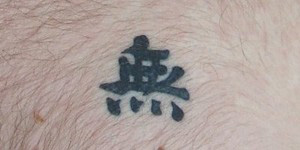
Why we love Japan
I started watching Japanese anime and sentai around 7 years old and I was deeply influenced by the message of these stories: life is hard. Life is full of catastrophes, but you have to keep positive and fight. It makes you stronger. It helps you become more wise, mature and powerful.
As a child, I was deeply impressed and attracted towards Japan, because of this.
Millions of children, like me, felt the same way: Japanese mind is a survival mind.
When I was 9 years old, I saw Leiji Matsumoto's "Captain Harlock". The first episode shows the end of the world. It looks like 100 time Hiroshima…
I was amazed: you can start a story with the end of the world ?
In Occident, the end of the world, is the end of the story. Because we have a different concept of time: for us (since Jesus Christ), time is a line. It has a beginning and an end. In Japanese mind, time goes round, like the 4 seasons.
In Japan, many many stories start with nuclear explosions and cataclysms: "Akira", is one of the most famous.
Cataclysm is just like "fuyu".
Beautiful flowers will bloom again, in one month. In one year. 20 years. 100 years.
Maybe this is why Japanese people keep so quiet and calm now.
In Europe, everybody is impressed. How is it possible to go to work, at office, when there is nuclear disaster near your town?
In Europe, it would be chaos. Complete panic. Thousands of people would fly away on the roads. There would be no post office, no bank, no supermarket open. There would be many dead.
In Japan, you avoid economical failure, because you keep working, all together.
And we admire that, very much.
It's a lesson to the world.
It made me think of a story concerning the "song of mu" 無. This story talks about Yuge no Dokyo, a very famous monk who was the lover of empress Koken. Many people said she was in love because Yuge had a huge penis. Some "senryu" talk about this: "Please, give me the "yuge size", asks the woman to the sextoy seller".
Yuge had such a huge penis, it looked like a tree.
And some "matsumushi", confusing his penis with a tree, came on it, during autumn, in order to sing their last love songs.
Yuge was listening to these shouting insects, thinking about the end of all things.
He still had a big erection, but his mind was connected with the emptiness.
Beauty in Japan is always related to death.
In Occident, beauty is something immortal. It has to look like statues.
In Japan, it must be "utsukushii" like in Sei Shonagon's "Makura no soshi": nice, fragile little "moe" things such as children, melon seeds, or baby chicks saying "hyo hyo".
Kenko writes in "Tsure-zure gusa" (CXXXVII): "More than the full beautiful moon, we prefer to look, just before morning shines, her stunning appearance, her spectral blue light behind mountains, on the edge of trees, through the the leaves or through rain. This is what make us shiver." Beauty about to disappear… Beauty soon to die, always attracts Japanese heart.
Beauty so very fragile.
The ancient word for earthquake is "nai", or "nae". We can find it in the "Nihon Shoki".
But Japanese classic literature rarely talks about it.
In 1212, Kamo no chomei made a very poignant description of earthquake in is "nikki": "Hojo-ki".
But I never read anything in poetry or "monogatari" talking about catastrophic event. Japanese classical literature is only about the disappearance of little, tiny things such as dew, "matsumushi" or foam. It seems that earthquake and big cataclysms appeared in literature and theater under the influence of gaijin. For example, there was a kabuki play called kabuki, "Jishin Kato", (from Kawatake Mokuami) in 1873. And, then, of course, after second world war, catastrophe became a very popular theme through "kaiju eiga", "manga" and modern literature.
I wonder why.
For more than a thousand years, Japanese people avoid talking about big deadly events : it's not tasteful
Little things are more tasteful, because more pitiful
the heart is moved by little creatures
the heart is what makes Japanese people go on, through all the difficulties
There is a French guy, David. He made a tattoo with "MU" kanji, on his heart, because he loves Japan, and especially the movies from Ozu. Ozu's tomb has MU kanji on it:http://japon.canalblog.com/archives/2005/06/12/652297.html
text=AGNES GIARD
アニエス・ジアール最新刊『エロティック・ジャポン』(河出書房新社)発売!!
『エロティック・ジャポン』
著者: アニエス・ジアール
翻訳: にむらじゅんこ
発売: 2010年12月22日
定価: 3,990円(本体3,800円)
ISBN: 978-4-309-24534-8
出版社:河出書房新社
内容:あまりに奇妙で、あまりに豊饒な日本のエロス的イメージ! 気鋭のフランス人女性ジャーナリストが論じる大胆な日本のエロティック・カルチャー……ロリコン、人形、制服フェチ、コスプレ、メイドカフェ、援助交際、風俗産業……現代アートや浮世絵、風俗雑誌など、約300点にのぼる豊富な図版を収録!
著者: アニエス・ジアール
翻訳: にむらじゅんこ
発売: 2010年12月22日
定価: 3,990円(本体3,800円)
ISBN: 978-4-309-24534-8
出版社:河出書房新社
内容:あまりに奇妙で、あまりに豊饒な日本のエロス的イメージ! 気鋭のフランス人女性ジャーナリストが論じる大胆な日本のエロティック・カルチャー……ロリコン、人形、制服フェチ、コスプレ、メイドカフェ、援助交際、風俗産業……現代アートや浮世絵、風俗雑誌など、約300点にのぼる豊富な図版を収録!
関連記事
欧米フェティッシュ・ジャーナル Fetish Journal
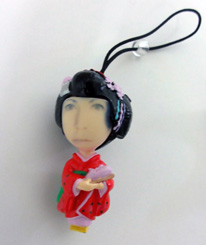
アニエス・ジアール - AGNES GIARD - 1969年生まれ。仏リベラシオン紙のジャーナリストであり、主にカウンターカルチャーや性に関する記事の専門家。日本のエロティシズムについて言及した著作 『エロティック・ジャポン』(仮)、『図解 ビザール・セックス全書』(仮)がそれぞれ河出書房新社と作品社より近日刊行予定。現在は京都の関西日仏交流会館ヴィラ九条山に滞在しており、日本における様々な恋愛物語についての本を準備中。

前田マナ 英国ランカスター大学演劇学部修士修了。専門は現代演劇やコンテンポラリーダンス。
ライターとしてウェブや雑誌等に雑文なども寄稿。
11.03.24更新 |
WEBスナイパー
>
エロティカルパレード・ジャポン!!
| |
| |


